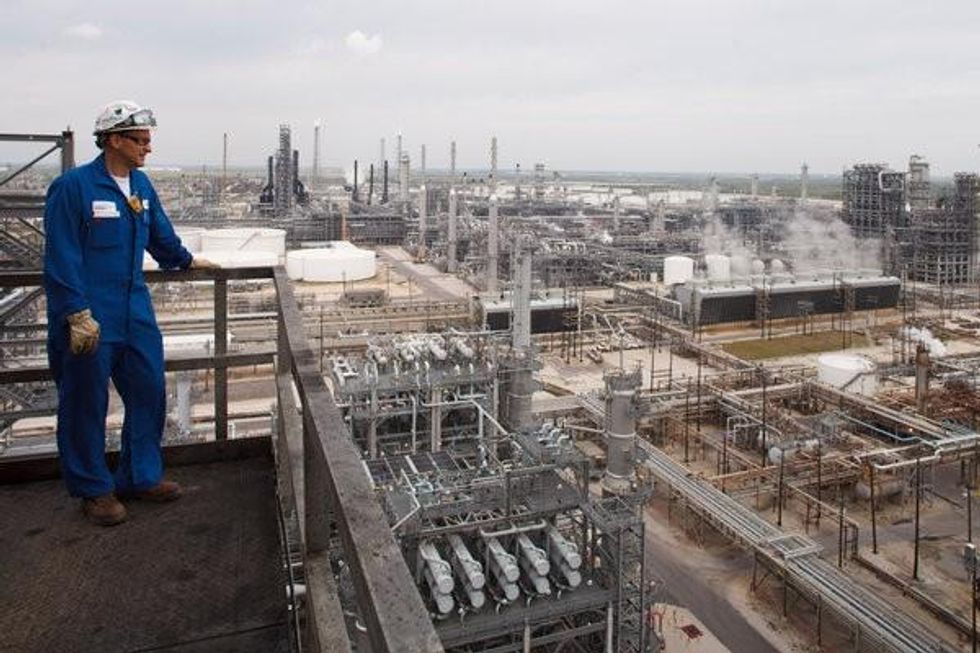Though the politicians continue to deny its possibility, some of the world's largest corporations (many of them also its biggest polluters) are already planning for the likelihood of a carbon tax or other financial penalty for industry-generated emissions that are leading the globe towards climate catastrophe.
As the New York Times reports on Thursday:
A new report by the environmental data company CDP has found that at least 29 companies, some with close ties to Republicans, including ExxonMobil, Walmart and American Electric Power, are incorporating a price on carbon into their long-term financial plans.
Both supporters and opponents of action to fight global warming say the development is significant because businesses that chart a financial course to make money in a carbon-constrained future could be more inclined to support policies that address climate change.
In a related but separate development, Inside Climate News reported earlier this week how Bloomberg financial services has introduced a new tool for professional analysts and traders who are already calculating how "companies might fare in the carbon-constrained economy" if and when some of the world's largest energy companies are forced to leave untapped fossil fuels reserves in the ground.
As ICN's Elizabeth Douglass reported:
In a move that underscores Wall Street's growing unease over the business-as-usual strategy of the world's fossil fuel companies, Bloomberg L.P. unveiled a tool last week that helps investors quantify for the first time how climate policies and related risks might batter the earnings and stock prices of individual oil, coal and natural gas companies.
The company's new Carbon Risk Valuation Tool is available to more than 300,000 high-end traders, analysts and others who regularly pore over the stream of information that's available through Bloomberg's financial data and analysis service. The move significantly broadens and elevates the discussion of "stranded" or "unburnable" carbon reserves--expanding it beyond climate groups and sustainability investors to the desks of the world's most active and influential investors and traders.
"It demonstrates that there's demand for the information--more and more investors are interested in these issues," said Ryan Salmon, senior manager of the oil and gas program at Ceres, a nonprofit that organizes businesses, investors and public interest groups interested in climate change and other issues.
But just because the world of business is proving more capable of analyzing what the scientific community has been saying in their warnings about climate change and globale warming, it doesn't necessarily translate that the world's mega-corporations will follow the policy solutions offered by the environmentalists, new economy advocates, and the endless train of sustainability experts who describe a vision of a new energy paradigm that upends the centralized hold of big business and the burning of dirty carbon-filled fossil fuels.
Even if the companies cited by the Times, including oil giant ExxonMobil, agree to a carbon tax, the terms under which they might accept such a scheme would likely not include agreements to leave huge reserves in the ground.
Unfortunately, according to the scientific consensus, that is exactly what must happen, carbon tax or not.
As recent research by Oil Change International shows, fossil fuel reserves are actually increasing even as what scientists call the "global carbon budget"--the amount of carbon the atmosphere and oceans can absorb--is rapidly shrinking.
"The first rule of holes is simple: when you're in one, stop digging. We are in a huge hole when it comes to the climate and yet we continue digging our way to climate catastrophe," said Stephen Kretzmann, Executive Director of Oil Change International. "There is no logical reason to continue expanding our fossil fuel reserves; doing so only continues to line the pockets of Big Oil, Gas and Coal executives while putting our communities and planet in peril."
Kretzmann's group calls for an end to fossil fuel subsidies as a way to signal to the big polluters that their support from government is over.
Instead, say experts, that same money should be used to invest in new sustainable forms of energy. Until truly cleaner forms of energy like wind and solar can compete with oil, coal, and gas economically, experts say that there is no way to convince politicians to end the extraction policies of the fossil fuel giants.
As one investment fund expert explained to Douglass: "I've talked to quite a few oil and mining companies about stranded assets, and the most consistent message that the companies give is 'we're not worried about stranded assets, because if you look at the [International Energy Agency] forecast, the Wood Mackenzie forecast and the BP Energy Outlook, demand is going to keep growing for coal and for oil up to 2030 or 2040. So this is not an issue.'"
In the end, companies like Exxon are about profit and little else. As the New York Times reports:
ExxonMobil, which last year was ranked by the Fortune 500 as the nation's most profitable company, is representative of Big Oil's slow evolution on climate change policy. A decade ago, the company was known for contributing to research organizations that questioned the science of climate change. In 2010, ExxonMobil purchased a company that produces natural gas, which creates less carbon pollution than oil or coal.
ExxonMobil is now the nation's biggest natural gas producer, meaning that it will stand to profit in a future in which a price is placed on carbon emissions. Coal, which produces twice the carbon pollution of natural gas, would be a loser. Today, ExxonMobil openly acknowledges that carbon pollution from fossil fuels contributes to climate change.
"Ultimately, we think the government will take action through a myriad of policies that will raise the prices and reduce demand" of carbon-polluting fossil fuels, said Alan Jeffers, an ExxonMobil spokesman.
______________________________________




